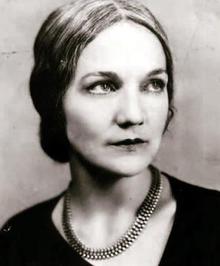
Katherine Anne Porter
Katherine Anne Porter (May 15, 1890 – September 18, 1980) was an American journalist, essayist, short story writer, novelist, poet and political activist. Her 1962 novel Ship of Fools was the best-selling novel in America that year, but her short stories received much more critical acclaim. In 1966 she was awarded the Pulitzer Prize for Fiction[1] and the U.S. National Book Award[2] for The Collected Stories of Katherine Anne Porter.
For other people with similar names, see Katherine Porter.
Katherine Anne Porter
Callie Russell Porter
May 15, 1890
Indian Creek, Texas, U.S.
September 18, 1980 (aged 90)
Silver Spring, Maryland, U.S.
- Journalist
- essayist
- short story writer
- novelist
- political activist
1920–1977
- Pulitzer Prize for Fiction (1965)
- National Book Award (1965)
-
John Koontz(m. 1906; div. 1915)
-
Ernest Stock(m. 1926; div. 1927)
-
Eugene Pressly(m. 1930; div. 1938)
-
Albert Erskine(m. 1938; div. 1942)
Biography[edit]
Early life[edit]
Katherine Anne Porter was born in Indian Creek, Texas, as Callie Russell Porter to Harrison Boone Porter and Mary Alice (Jones) Porter. Although her father claimed maternal descent from American frontiersman Daniel Boone, Porter herself altered this alleged descent to be from Boone's brother Jonathan as "the record of his descendants was obscure, so that no-one could contradict her." This relationship was unfounded.[3] Porter was enthusiastic about her own genealogy and family history, and spent years constructing a "quasi-official" version of her ancestry alleging descent from a companion of William the Conqueror,[4] although "most of the genealogical connections she boasted did not exist."[5] The writer O. Henry (William Sydney Porter) was claimed as her father's second cousin,[6] but later research established that "except the accident of her name", there was no connection. Despite her focus on her family history, Porter failed to identify her relationship to Lyndon B. Johnson, 36th President of the United States, his grandmother being the sister of Porter's uncle-by-marriage.[7] The rest of Porter's family did not take her genealogical embellishments seriously, considering them to be part of her character as an "accomplished raconteur".[8]